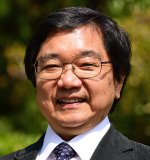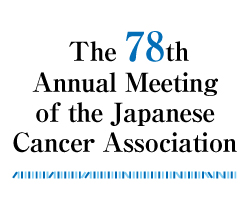Welcome Message
Converging all sciences to cancer therapies
- President, The 78th Annual Meeting of the Japanese Cancer Association
Fuyuki Ishikawa, M.D., D.M.Sci.
(Professor, Kyoto University Graduate School of Biostudies) 
As the president of the 78th annual meeting of the Japanese Cancer Association, I welcome all participants to Kyoto and look forward to three days of excellent discussions on how we can defeat cancer. Recently we have witnessed great advances in cancer therapeutics. Targeting key driver mutations responsible for cancer progression has offered us a way of treating patients with a rationally designed strategy, and a wealth of knowledge about cancer genomics obtained by globally collaborating scientists has made molecularly targeted therapies an accurate and effective reality for individual patients. We have especially been excited by cancer immunotherapy, as highlighted by the 2018 Nobel prize in physiology and medicine awarded to two prominent scientists in this field.
Cancer is a disease that progresses through Darwinian evolution, and understanding how cancer cells, unlike normal cells, acquire genetic instability, which drives their evolution without excessively reducing their fitness, is one of the central problems in understanding how cancer arises. It is also important to keep in mind that cancer progression is not a cell-autonomous process. It happens in the context of complicated and mutual interactions between cancer cells and their surrounding environments. Ever-fluctuating surrounding oxygen and nutrient concentrations, immunological attack and iatrogenic stresses are among the major players contributing to the selection process. Thus, elucidating the fine details of the cancer-microenvironment will give us novel leads toward anti-cancer strategies. Furthermore, we recognize that in order to conquer cancer we need to have a synergized approach that enlists branches of science that hitherto have not been perceived as major fields in cancer biology, such as bioinformatics and systems biology. We have therefore subtitled the meeting as “Converging all sciences to cancer therapies.”
This meeting offers programs covering a broad range of inter-disciplinary sciences, from basic to clinical, by top scientists, including Dr. Tasuku Honjo, one of the 2018 Nobel prize awardees. I sincerely hope that all participants will enjoy the scientific discussions as well as the culture in Kyoto.

